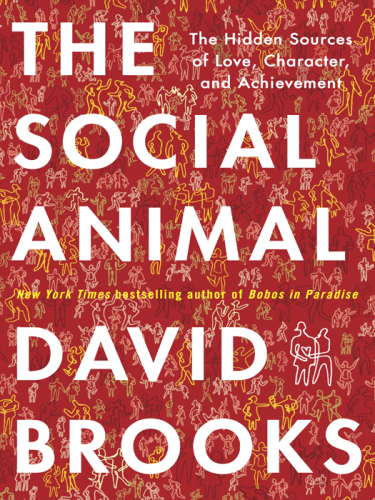
The Social Animal
The Hidden Sources of Love, Character, and Achievement
کتاب های مرتبط
- اطلاعات
- نقد و بررسی
- دیدگاه کاربران
نقد و بررسی

May 30, 2011
Brooks delivers alook at the impact of social influence on the individual that will help many reconsider what shapes them. He structures this work of the latest research in psychology and sociology (with emphasis on social psychology) in the tradition of Rousseau's Emile, creating two fictional characters whose choices and decisions throughout their lives are contextualized by a myriad of social, economic, and cultural forces. With a friendly projection, Arthur Morey narrates with a strong, calm, and deliberate tone, making sure each piece of this complex puzzle is understood, and Brooks's prose certainly invites this approach. With well-chosen emphasis and pauses, Morey engages listeners with a sincere tone that comes close to condescension, but never actually crosses over. Both Morey and Brooks are enthusiastic, but shy away from being preachy. A Random hardcover.

January 31, 2011
New York Times columnist Brooks (Bobos in Paradise) raids Malcolm Gladwell's pop psychology turf in a wobbly treatise on brain science, human nature, and public policy. Essentially a satirical novel interleaved with disquisitions on mirror neurons and behavioral economics, the narrative chronicles the life cycle of a fictional couple—Harold, a historian working at a think tank, and Erica, a Chinese-Chicana cable-TV executive—as a case study of the nonrational roots of social behaviors, from mating and shopping to voting. Their story lets Brooks mock the affluent and trendy while advancing soft neoconservative themes: that genetically ingrained emotions and biases trump reason; that social problems require cultural remedies (charter schools, not welfare payments); that the class divide is about intelligence, deportment, and taste, not money or power. Brooks is an engaging guide to the "cognitive revolution" in psychology, but what he shows us amounts mainly to restating platitudes. (Women like men with money, we learn, while men like women with breasts.) His attempt to inflate recent research on neural mechanisms into a grand worldview yields little except buzz concepts—"society is a layering of networks"—no more persuasive than the rationalist dogmas he derides.

Starred review from January 15, 2011
Through the lens of a hypothetical couple and their offspring, New York Times columnist Brooks (On Paradise Drive: How We Live Now (and Always Have) In the Future Tense, 2005, etc.) cleverly explores the realms of the psyche and the unconscious mind.
Though culture and politics comprise the bulk of the author's journalistic expertise, the social behavior of humans has always fascinated him. Taking cues from Rousseau, whose controversial treatise Emile charted human educational development through imagined characters, Brooks employs a similar novelistic narrative device in his intricate analysis of two upwardly mobile, likeminded individuals. The fictional couple's initial meeting spurs the author to personify the dynamics of attraction via their gender-specific "primitive passions" ("Rob was looking at cleavage, Julia was looking for signs of trustworthiness"), primal scents and cues that would anticipate a lifelong romance. "Aided by chemistry and carried along by feeling," Rob and Julia troubleshoot cohabitation blunders, carnal urges and the birth of son Harold, who, together with his wife-to-be Erica (introduced chapters later), ultimately becomes the focus of the author's behavioral paradigm. Harold's mental development proceeds from kindergarten to high school via cliques, phases and a taboo student-teacher crush. The author expands his group with Erica, an ambitious, ethnically diverse girl raised in a poor public housing project. She excels at a challenging educational platform in her youth and achieves success as a business consultant by cultivating ideas and having Harold develop them for real-world application. Their evolution as husband and wife and consummate professionals is not, however, without a fair share of stumbles. If a bit bloated, the narrative is compelling as Brooks effectively interweaves history, science, statistics and instinctual behavioral patterns into a fictional treatment that reiterates his belief in "the way unconscious affections and aversions shape daily life."
An uncommonly brilliant blend of sociology, intellect and allegory.
(COPYRIGHT (2011) KIRKUS REVIEWS/NIELSEN BUSINESS MEDIA, INC. ALL RIGHTS RESERVED.)

Starred review from March 15, 2011
Following the example of Jean-Jacques Rousseaus Emile, Brooks offers fictional characters Harold and Erica to illustrate how humans communicate, are educated, and succeedor dont. Synthesizing research on human unconsciousness, Brooks meshes sociology, psychology, and economics to show how character is formed and how we strive for happiness and success. He follows Harold, from a solid middle-class background, and Erica, from a working-class background, from birth, through school, work, love, marriage, and into old age, detailing their lives, the choices they make given the complexities of their personal histories, the histories of their families, and the backdrops of their lives. Through Harold and Erica, Brooks masterfully details how we all are led to the choices we make and how they define our lives. He offers a new look at the assumptions we make about life and a close, deep examination of the failure of social and economic policies that do not take into account the complexities of human behavior, treating us as if we were totally rational and guided by our thoughts rather than some combination of intellect and emotion. Brooks, New York Times columnist and author of Bobos in Paradise (2000), is engaging as well as comprehensive about a revolution in consciousness.(Reprinted with permission of Booklist, copyright 2011, American Library Association.)

























دیدگاه کاربران